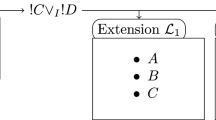Abstract
Imperatives may be interpreted with many subvarieties of directive force, for example as orders, invitations, or pieces of advice. I argue that the range of meanings that imperatives can convey should be identified with the variety of interpretations that are possible for non-dynamic root modals (what I call ‘priority modals’), including deontic, bouletic, and teleological readings. This paper presents an analysis of the relationship between imperatives and priority modals in discourse which asserts that, just as declaratives contribute to the Common Ground and thus provide information relevant to the interpretation of epistemic modals in subsequent discourse, imperatives contribute to another component of the discourse context, the addressee’s To-Do List, which serves as a contextual resource for the interpretation of priority modals. This analysis predicts that the interpretation of imperatives and modals in discourse is constrained in surprising ways; these predictions are borne out.
Similar content being viewed by others
References
Bennett J. (2003). Philosophical guide to conditionals. Oxford, Oxford University Press
Bhatt R. (1998). Obligation and possession. In Harley H. (ed). Papers from the UPenn/MIT roundtable on argument structure and aspect. Cambridge, MA, MITWPL.
Brennan V. (1993). Root and epistemic modal auxiliary verbs. Amherst, GLSA
Davies E. (1986). The English imperative. London, Croom Helm
Drubig, H. (2001). On the syntactic form of epistemic modality. Ms. University of Tübingen.
Feldman F. (1986). Doing the best we can. Dortrecht, Reidel
Ginzburg J. (1995a). Resolving questions, part I. Linguistics and Philosophy 18(5): 459–527
Ginzburg J. (1995b). Resolving questions, part II. Linguistics and Philosophy 18(6): 567–609
Hacquard, V. (2006). Aspects of modality. Ph.D. Thesis, MIT.
Halliday M. (1970). Functional diversity in language as seen from a consideration of modality and mood in English. Foundations of Language 6, 322–361
Han, C.-H. (1998). The structure and interpretation of imperatives: Mood and force in Universal Grammar. Ph.D. Thesis, University of Pennsylvania.
Han C.-H. (1999). Deontic modality, lexical aspect and the semantics of imperatives. In Linguistics in the morning calm 4. Seoul, Hanshin Publications
Jackendoff R. (1972). Semantic interpretation in generative grammar. Cambridge, Mass., MIT Press
Kaplan D. (1989). Demonstratives: An essay on the semantics, logic, metaphysics, and epistemology of demonstratives and other indexicals. In: Almog J., Perry J., Wettstein H. (eds). Themes from Kaplan. New York, Oxford University Press, pp. 481-563
Kratzer A. (1977). What “must” and “can” must and can mean. Linguistics and Philosophy 1(1): 337–355
Kratzer A. (1981). The notional category of modality. In: Eikmeyer H.-J., Rieser H. (eds). Words, worlds, and contexts. Berlin, de Gruyter, pp. 38-74
Lascarides, A., & Asher, N. (2003). Imperatives in dialogue. In P. Kuehnlein, H. Rieser, & H. Zeevat (Eds.), The semanatics and pragmatics of dialogue for the new millenium. Philadelphia: Benjamins.
Lewis D.K. (1979). A problem about permission. In: Saarinen E., Hilpinen R., Niiniluoto I., Hintikka M.P. (eds). Essays in honour of Jaakko Hintikka. Dordrecht, Reidel, pp. 163-175
Lyons J. (1977). Semantics. Cambridge, Cambridge University Press
Ninan D. (2005). Two puzzles about deontic necessity. In: Gajewski J., Hacquard V., Nickel B., Yalcin S. (eds). New work on modality, Vol. 51 of MIT Working Papers in Linguistics. Cambridge, MA, MITWPL, pp. 149-178
Pak, M. (2004). Sentence types in Korean. Ms., Georgetown University. May be downloaded at http://www.georgetown.edu/faculty/portnerp/nsfsite/nsfframeset.htm
Pak, M., Portner, P., & Zanuttini, R. (2004). Deriving Clause Types: Focusing on Korean. In Proceedings of the Linguistic Society of Korea 2004, Yonsei Institute of Language and Information Studies (pp. 359–368). Seoul: Hanshin Publishing Company.
Pak, M., Portner, P., & Zanuttini, R. (2006). What Korean promissives tell us about jussive clause types. Ms., Georgetown University. May be downloaded at http://www.georgetown.edu/faculty/portnerp/nsfsite/nsfframeset.htm
Palmer F. (2001). Mood and modality (2nd ed.). Cambridge, Cambridge University Press
Papafragou A. (2006). Epistemic modality and truth conditions. Lingua 116, 1688–1702
Platzack C., Rosengren I. (1994). On the subject of imperatives. A minimalist account of the imperative pronoun and negated imperatives. Sprache und Pragmatik 34, 26–67
Poletto, C., & Zanuttini, R. (2003). Making imperatives: Evidence from Central Rhaetoromance. In C. Tortora (Ed.), The syntax of Italian dialects (pp. 175–206). Oxford University Press.
Portner P. (2003). The temporal semantics and modal pragmatics of the perfect. Linguistics and Philosophy 26, 459–510
Portner, P. (2004). The semantics of imperatives within a theory of clause types. In K. Watanabe & R. B. Young (Eds.), Proceedings of Semantics and Linguistic Theory 14. Cornell University Linguistics Department: CLC Publications.
Portner, P. (2007). Beyond the common ground: The semantics and pragmatics of epistemic modals. In K.-A. Kim & J.-Y. Yoon (Eds.), The perspectives of linguistics in the 21st century.
Portner, P. (to appear). Modality. Oxford: Oxford University Press.
Potsdam, E. (1996). Syntactic issues in English imperatives. Ph.D. Thesis, University of California at Santa Cruz.
Potts, C. (2003). Keeping world and will apart: A discourse-based semantics for imperatives. Talk delivered at the NYU Syntax/Semantics Lecture Series, October 17, 2003.
Roberts, C. (1996). Information structure in discourse: Towards an integrated formal theory of pragmatics. In J.-H. Toon & A. Kathol (Eds.), Papers in semantics, OSU Working Papers in Linguistics, Vol. 49. Columbus: The Ohio State University.
Roberts, C. (2004). Context in dynamic interpretation. In Handbook of pragmatics. Oxford and Malden, MA: Blackwell.
Ross, J. R. (1969). Auxiliaries as main verbs. In W. Todd (Ed.), Studies in philosophical linguistics (series 1). Evanston, IL: Great Expectations Press.
Schlenker P. (2003). A plea for monsters. Linguistics and Philosophy 26, 29–120
Schmerling S. (1975). Imperative subject deletion and some related matters. Linguistic Inquiry 6(3): 501–511
Schwager, M. (2005). Permitting permissions. In J. Gervain (Ed.), Proceedings of the Tenth ESSLLI Student Session.
Schwager, M. (2007). Conditionalized imperatives. In C. Tancredi, M. Kanazawa, I. Imani, & K. Kusumoto (Eds.), Proceedings of SALT 16. Cornell University Linguistics Department: CLC Publications. http://research.nii.ac.jp/salt16/proceedings.html
Segerberg K. (1990). Validity and satisfaction in imperative logic. Notre Dame Journal of Formal Logic 31(2): 203–221
Shim, J., Lee, K., & Lee, C. (1977). Introduction to semantics. Chipmun-dang.
Stalnaker R. (1974). Pragmatic presupposition. In: Munitz M., Unger P. (eds). Semantics and philosophy. New York, New York University Press, pp. 197-213
Stalnaker R. (1978). Assertion. In: Cole P. (ed). Syntax and semantics 9: Pragmatics. New York, Academic Press, pp. 315-332
Swanson, E. (2006). Something “might” might mean. Ms., University of Michigan.
von Fintel, K. (2003). Epistemic modals and conditionals revisited. Handout of a talk presented at the University of Massachusetts at Amherst, Dec. 12, 2003. http://web.mit.edu/fintel/www/umass-handout.pdf
Wilson D., Sperber D. (1988). Mood and the analysis of non-declarative sentences. In: Dancy J., Moravcsik J., Taylor C. (eds). Human agency: Language, duty and value. Stanford, CA, Stanford University Press, pp. 77-101
Wurmbrand S. (1999). Modal verbs must be raising verbs. In: Bird S., Carnie A., Haugen J., Norquest P. (eds). The Proceedings of WCCFL 18. Somerville, MA, Cascadilla, pp. 599-612
Zanuttini, R. (2004). Understanding the restrictions on imperative subjects. Paper presented at the X Giornata di Dialettologia, University of Padua, June 24, 2004. http://www.georgetown.edu/faculty/portnerp/nsfsite/nsfframeset.htm Imperatives and modals
Author information
Authors and Affiliations
Corresponding author
Rights and permissions
About this article
Cite this article
Portner, P. Imperatives and modals. Nat Lang Semantics 15, 351–383 (2007). https://doi.org/10.1007/s11050-007-9022-y
Received:
Accepted:
Published:
Issue Date:
DOI: https://doi.org/10.1007/s11050-007-9022-y




